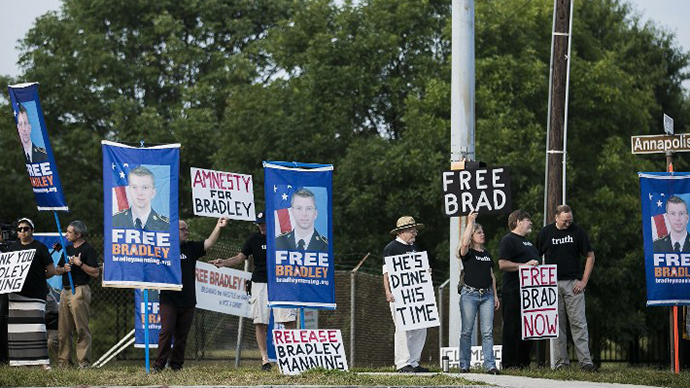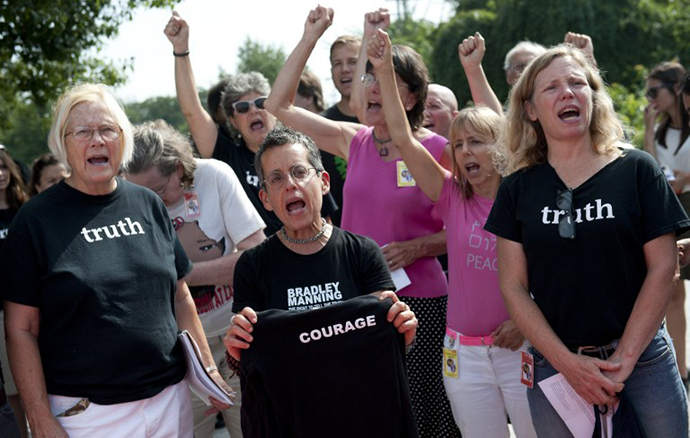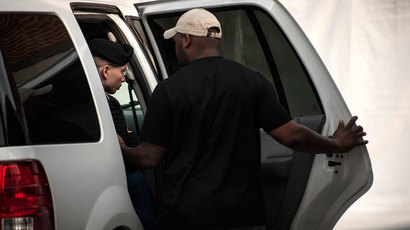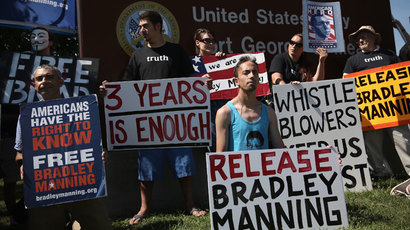Bradley Manning sentenced to 35 years in prison
A US military judge has sentenced Army Private Bradley Manning to 35 years in prison. Manning faced up to 90 years behind bars, while prosecutors sought to put the whistleblower away for a minimum of six decades.
For reaction and more details follow RT's LIVE
UPDATES
Manning will be credited with the 1,294 days he spent in pre-trial confinement plus an additional 112 days. He was also dishonorably discharged, saw his rank reduced to Private from Private First Class and was forced to forfeit all pay and benefits. No additional fine, however, was levied against him. Manning will have to serve a third of his sentence before he is eligible for parole.
Col. Denise Lind, who on Tuesday began her deliberations in the court-martial case, announced the sentence shortly after 10am local time (14:00 GMT). Lind read out the sentence succinctly and provided no other statement as a gaggle of journalist’s waited in anticipation. Flanked by his lawyers, Manning, 25, stood at attention and appeared not to react when Lind announced the punishment, AP reports.
#Manning sentenced to 35 years. Means he'll likely serve about 8 to 8.5 yrs more in confinement and be out by the time he's 33 or 34.
— Col. Morris Davis (@ColMorrisDavis) August 21, 2013
Manning's lawyer David E. Coombs told reporters that Manning
actually comforted the weeping defense attorneys as Lind read the
verdict.
"He looks to me and he says, 'It's OK. It's alright. I know you did your best. I'm going to be OK. I'm going to get through this,'" Coombs said.
During a press conference after Lind handed down the sentence, Coombs read a short statement from Manning in which the whistleblower compared US policies enacted after the September 11, 2001 terrorist attacks to shameful events in the nation's history.
"In our zeal to kill the enemy, we internally debated the definition of torture. We held individuals at Guantanamo for years without due process. We inexplicably turned a blind eye to torture and executions by the Iraqi government. And we stomached countless other acts in the name of our War on Terror," he said.
"Patriotism is often the cry extolled when morally questionable acts are advocated by those in power. When these cries of patriotism drown out any logically-based dissention [sic], it is usually an American soldier that is ordered to carry out some ill-conceived mission.
"Our nation has had similar dark moments for the virtues of democracy—the Trail of Tears, the Dred Scott decision, McCarthyism, the Japanese-American internment camps—to name a few. I am confident that many of our actions since 9/11 will one day be viewed in a similar light," Manning's statement continued.
"As the late Howard Zinn once said, ‘There is not a flag large enough to cover the shame of killing innocent people.’"
Coombs also revealed to media members that prosecutors had
initially offered Manning a lower sentence in exchange for a
guilty plea. He refusing to elaborate on the details, citing a
non-disclosure agreement, but admitted Manning would have been
given a sentence smaller than 35 years had he accepted, according
to Washington Post researcher Julie Tate.
Immediately after sentencing, Amnesty International called on
President Barack Obama to commute Manning’s sentence to time
already served to allow his immediate release.
"Instead of fighting tooth and nail to lock him up for
decades, the US government should turn its attention to
investigating and delivering justice for the serious human rights
abuses committed by its officials in the name of countering
terror,” said Widney Brown, Senior Director of International
Law and Policy at Amnesty International.
The American Civil Liberties Union was also quick to excoriate
the decision.
“When a soldier who shared information with the press and
public is punished far more harshly than others who tortured
prisoners and killed civilians, something is seriously wrong with
our justice system,” said Ben Wizner, director of the ACLU’s
Speech, Privacy and Technology Project.
Elizabeth Goitein, co-director of the Liberty and National
Security Program at the Brennan Center for Justice, decried the
sentence as "unprecedented" in its magnitude.
"It's more than 17 times the next longest sentence ever
served" for providing secret material to the media," said
Goitein. "It is in line with sentences for paid espionage for
the enemy."
WikiLeaks, however, argues the sentence can be perceived as a
victory for Manning, as it leaves open the possibility that he
will be released within a decade's time or less. Again,
under federal law, Manning must serve one-third of his sentence
before he is eligible for parole and has been given credit for
time already served.
Significant strategic victory in Bradley Manning case. Bradley Manning now elegible for release in less than 9 years, 4.4 in one calculation
— WikiLeaks (@wikileaks) August 21, 2013
Manning's sentence will automatically be sent to the Army Court of Criminal Appeals as it exceeds a period of one year.
Before that process can get underway, however, the entire court-martial proceedings must be turned into an official transcript, which the defense, prosecution, and judge must sign off on.
That process will most likely be lengthy in duration.
Manning will have the option of petitioning General Jeffrey Buchanan, the Convening Authority overseeing the trial, for clemency. General Buchanan also has the option of reducing the sentence on any particular count or overturning it altogether. Conversely, Buchanan cannot overturn a not guilty verdict or tack on time to the sentence.
Coombs had previously asked the judge for leniency, requesting a
sentence that did not “rob him of his youth." Coombs
argued that Manning's leaks had not endangered the US.
The prosecution had sought a 60-year sentence, arguing the stiff
term would deter others from leaking classified information.
"There's value in deterrence," prosecutor Capt. Joe Morrow
said in his closing argument on Monday.

Last week the 25-year-old Manning apologized for the “unintended
consequences” of his actions, saying he believed he was
“going to help people, not hurt people."
He told the court at Fort Meade, Maryland, that "the last
three years have been a learning experience for me."
WikiLeaks responded to Manning’s mea culpa, saying “the only
currency this military court will take is Bradley Manning’s
humiliation.” The anti-secrecy group continued that Manning’s
“forced” apology was done in the hopes of “shaving a
decade or more off his sentence.”
The soldier was convicted last month of 20 charges including
espionage, theft and violating computer regulations. Manning was
found not guilty, however, of the most serious charge – aiding
the enemy – which entailed a potential sentence of life without
the possibility of parole.
Manning faced up to 90 years in prison for passing on more than
700,000 Iraq and Afghanistan battlefield reports and State
Department diplomatic cables to WikiLeaks while working as an
intelligence analyst in Iraq in 2010. He was later arrested in
Iraq in May of that year.
He also leaked ‘Collateral Murder’ video, which shows a US
helicopter attack in Baghdad in which at least nine
non-combatants were killed, including a Reuters news photographer
and his driver.
Manning is entitled to appeal against any verdict handed to him
by the court-martial in the Army Court of Criminal Appeal within
six months.
Manning was expected to be transferred to prison at Fort Leavenworth, Kansas on Wednesday, according to The Guardian. He was held at the prison after his long stint in solitary confinement ended in April 2011 until being sent to trial at Fort Meade, Virginia.
Fort Leavenworth, a foreboding stone complex deemed operational in 1903, is the only penitentiary designated for military prisoners who are sentenced to more than ten years behind bars.
A medium-security facility, inmates are highly restricted in
their movement but generally work 40-hour weeks in the kitchen,
laundry, or hold a variety of other duties. They are forbidden
from spending more than $80 a month, but only earn pennies for
every week they work.
Raelean Finch, who chronicles life inside Leavenworth on the Captain Incarcerated blog with an anonymous inmate, said the conditions are more hospitable than prisons for the civilian population.
"It's presided over by military folks," Finch told the Associated Press. "These are people who cleaned bathrooms with a toothbrush during basic training."
Lieutenant William Calley was previously held at the prison for his involvement with the infamous 1968 My Lai Massacre during the Vietnam War. Sergeant Robert Bales will soon join Manning after killing 16 Afghan civilians in 2012. Also expected to be sent to Fort Leavenworth is Major Nidal Hasan, who is currently on trial for killing 13 people and wounding over 30 others during a 2009 attack at Fort Hood.















